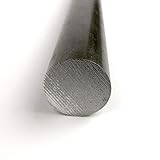All Categories




1018 Carbon Steel Round Bar, Unpolished (Mill) Finish, Cold Finish, ASTM A108, 1.375" Diameter, 36" Length, OnlineMetals
Share Tweet
*Price and Stocks may change without prior notice
*Packaging of actual item may differ from photo shown
- Electrical items MAY be 110 volts.
- 7 Day Return Policy
- All products are genuine and original
- Cash On Delivery/Cash Upon Pickup Available








1018 Carbon Steel Round Bar, Unpolished Features
-
1018 steel has a good combination of all of the typical traits of steel - strength, some ductility, and comparative ease of welding and machining.
-
1.375" Diameter, 36" Length
-
Cold Roll 1018 is typically used in pins, rods, shafts, spindles, and sprockets
-
Meets ASTM-A108
About 1018 Carbon Steel Round Bar, Unpolished
The 1018 carbon steel round rod has been cold finished, has an unpolished (mill) surface, meets American Society for Testing and Materials International ASTM A108 specifications, and has a standard tolerance. The 1018 carbon steel grade has low carbon content for a balance of strength, machinability, formability, and weldability. This material can be heat treated for higher hardness. The rod has been cold finished, a process of removing the outer layer to achieve the specified dimensions. Steel is an iron alloy with carbon and other elements that modify the steel to achieve specific properties. In general, steels with higher carbon content have greater strength, hardness, and wear resistance, while those with lower carbon content have more formability, weldability, and toughness. Carbon steels, which include most AISI-SAE grades in the 1000 range, are classified by their level of carbon content as low (below 0.3%), medium (0.3% to 0.6%) and high (0.6% and above). Alloy steels, which include AISI-SAE grades in the 1300 and 4000 ranges and above, incorporate elements such as chromium, molybdenum, and nickel to modify properties like machinability and corrosion resistance. Tool steels, which include most grades with a letter and number grade designation, have high carbide content for wear resistance, high hardness, and the ability to hold a cutting edge. Some tool steels are designed to resist deformation when used in elevated temperatures. Tensile strength, used to indicate a material’s overall strength, is the peak stress it can withstand before it breaks. Wear resistance indicates the ability to prevent surface damage caused by contact with other surfaces. Toughness describes the material's ability to absorb energy before breaking, while hardness (commonly measured as indentation hardness) describes its resistance to permanent surface deformation. Formability indicates how easily the material can be permanently shaped. Machinability describes how easily it can be cut, shaped, finished, or otherwise machined, while weldability characterizes the ability to be welded.





















